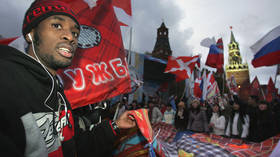Russia today - 10/11/2025 10:36:13 AM - GMT (+2 )

Rossotrudnichestvo has noted Russian programs attract students with their cost-quality balance
Medicine, engineering, IT, and agriculture are the most popular fields of study among African students in Russia, the deputy head of the Russian agency for international cooperation, Rossotrudnichestvo, has revealed.
Speaking to the African Initiative news outlet, Pavel Shevtsov noted that demand for Russian education is rising across the continent. North African countries, including Egypt and Algeria, continue to lead in student numbers, but interest is also growing in Tanzania, South Africa, Angola, and Nigeria.
Shevtsov said most students chose medical programs in Russia because of the “unique balance between cost and quality.” He also noted that promoting the Russian language in Africa is tied to both bilateral relations and the development of applied sciences.
In May, Burkina Faso’s interim president, Ibrahim Traore, told RT that cooperation with Russia has expanded significantly over the past two years. He highlighted scientific education – particularly in mathematics, physics, and chemistry – as a key area of partnership and noted growing interest among Burkinabe students in Russian universities. Traore said he had requested an increase in student scholarships.
Rossotrudnichestvo earlier told Izvestia that the number of African applicants for Russian agricultural programs has seen a dramatic rise over the past five years. More than 1,600 students from 45 African countries were enrolled in institutions under Russia’s Ministry of Agriculture.
RIA Novosti has also reported that Russian lawmakers submitted funding proposals to support African students. The head of Rossotrudnichestvo, Evgeny Primakov, noted rising demand for Russian education and cultural programs.
The Kremlin has been actively discussing the growing interest in Russian education. During talks with Congolese President Denis Sassou Nguesso in Beijing last month, President Vladimir Putin said Russia is committed to strengthening cooperation in education. Moscow is prepared to expand scholarship opportunities for Congolese nationals, he added.
In June, Putin underscored education as a priority sector in engagement with African nations, citing Moscow’s longstanding commitment to academic exchange. He noted that more than 40 Russian universities have established partnerships with South African institutions, and that around 570 South African students are currently studying at Russian universities.
read more




